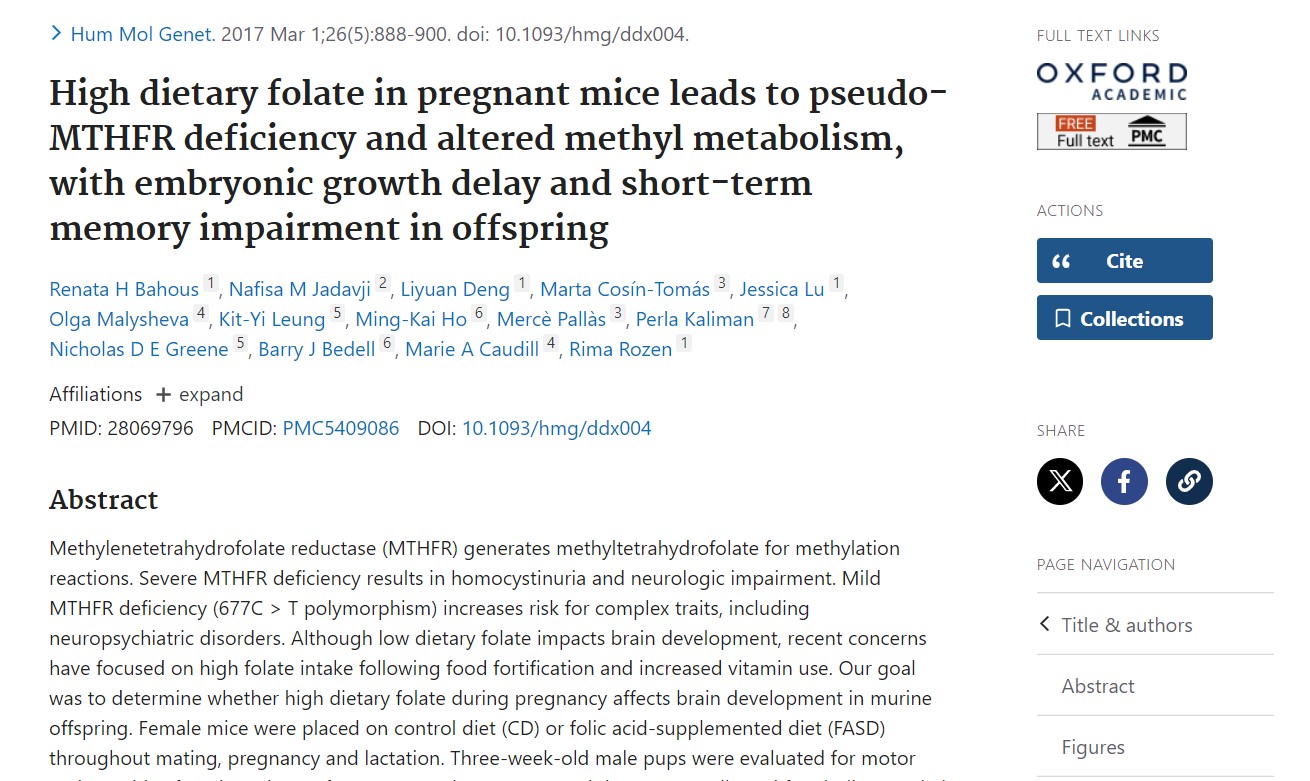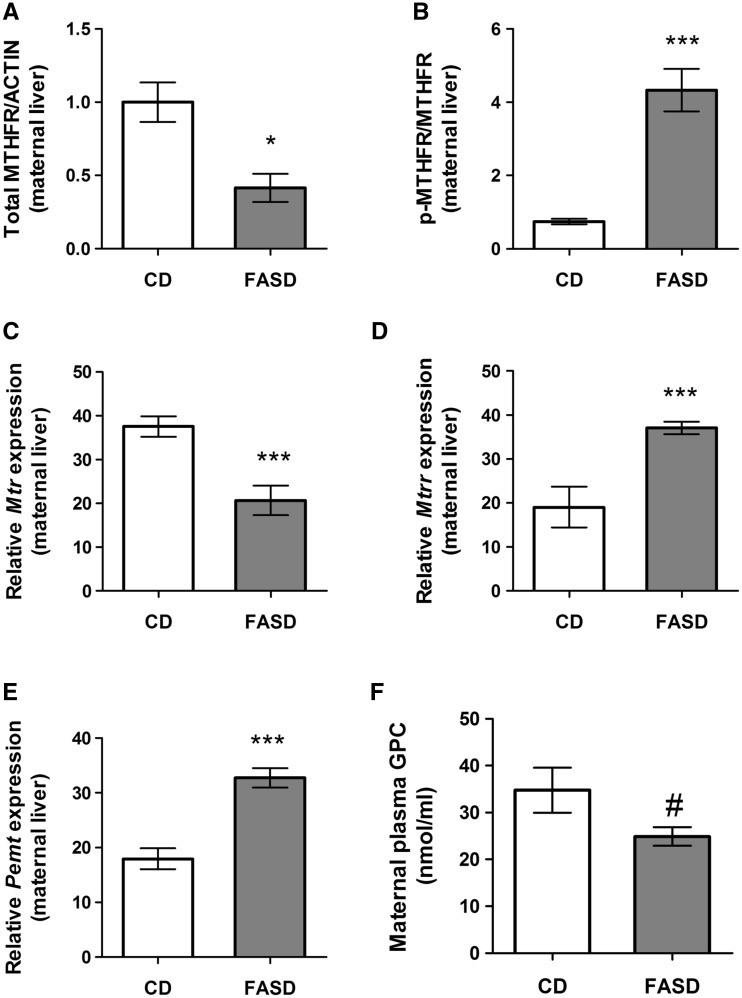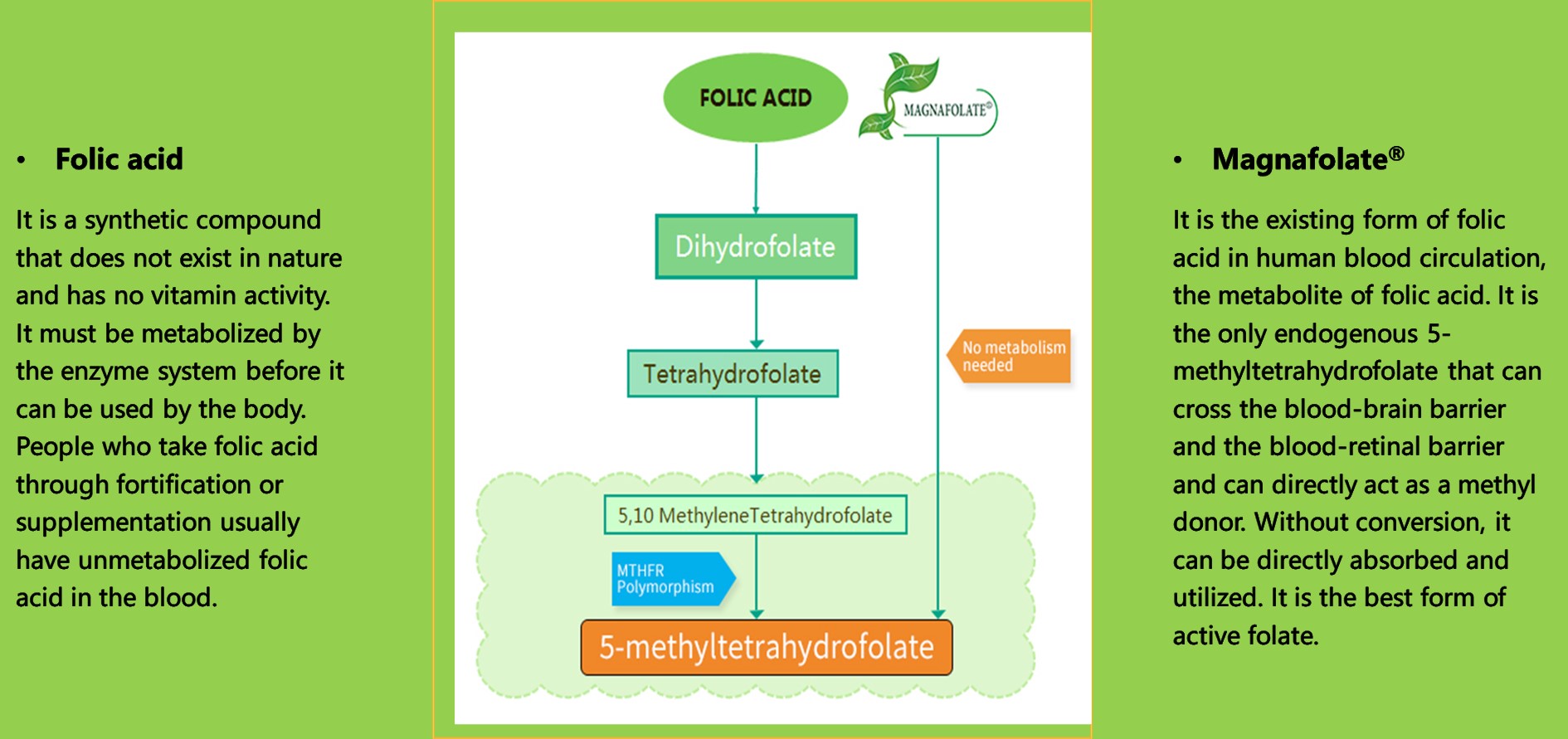I. Surprise! Excessive Folate Supplementation During Pregnancy May Impair Fetal Memory?
A study published in 2017 in Human Molecular Genetics garnered significant attention from the academic community: A team from McGill University in Canada discovered that feeding pregnant mice a high dose of synthetic folic acid (20 mg/kg, ten times the standard diet) led to "pseudo MTHFR deficiency" in their offspring— the activity of the key enzyme MTHFR in the liver was reduced by three times, resulting in methyl metabolism disorders, decreased embryonic weight, and even hippocampal atrophy and impaired short-term memory test scores at three weeks of age.

Why does this happen?
Traditional synthetic folic acid (FA) must be converted by the MTHFR enzyme into its active form, 5-Methyltetrahydropteroic acid (MTHF), to be utilized by the body. However, a high dose of synthetic folic acid can "flood" the metabolic pathway, inhibiting the activity of the MTHFR enzyme. This is akin to a traffic jam on a highway that prevents key supplies from being transported, ultimately leading to a shortage of methyl donors (such as S-adenosylmethionine), affecting DNA methylation and neurotransmitter synthesis, and causing the fetal brain development to "veer off course."

II. The Metabolic Trap of Synthetic Folic Acid: More Supplementation ≠ Better Absorption
There are "two hurdles" to the metabolism of synthetic folic acid in the human body:
Enzyme Activity Dependence: 78.4% of people have MTHFR gene variations (such as C677T), with inherently low enzyme activity, making them more prone to metabolic disorders when supplemented with synthetic folic acid.
Dose Sensitivity: Synthetic folic acid in excess of physiological needs can competitively inhibit the MTHFR enzyme and even accumulate unmetabolized folic acid in the blood, increasing the risk of colon and breast cancer.

III. Naturalization Folate - Magnafolate: Skip the Metabolic Hurdles, Safe and Precise Folate Supplementation
As naturalized (active) folate, Magnafolate (6S-5-Methyltetrahydropteroic acid) does not require conversion by the MTHFR enzyme and is directly absorbed and utilized by the body, thereby avoiding the metabolic pitfalls of traditional synthetic folic acid:
Zero Metabolic Burden: Magnafolate has a purity of ≥99.8% and participates in the methyl cycle in a "finished product form," like directly supplying "fuel" to cells, without relying on the MTHFR enzyme, making it efficiently utilizable even by people with MTHFR gene mutations.
Controllable Dose: Direct absorption without the risk of accumulating unmetabolized folic acid.
Safety Verification: Certified as "naturalization folate," it is effectively non-toxic, with no observed inhibition of MTHFR enzyme activity after long-term use, and no embryonic development abnormalities were found in the high-dose group of mouse experiments (equivalent to 100 times the recommended human dose).

IV. A Scientific Guide to Folate Supplementation for Expectant Mothers
Choose the Right Form: Prioritize active folate (such as Magnafolate), especially for pregnant women with MTHFR gene mutation detections or a family history of neural tube defects.
Control the Dose: The recommended daily intake of folate during pregnancy is 600-800 μg. Caution is advised when consuming more than 200 μg/day of synthetic folic acid to avoid the risk of accumulating unmetabolized folic acid.
Dynamic Monitoring: Regularly test serum folate and homocysteine levels to avoid "pseudo-normal" folate levels caused by synthetic folic acid (high blood folate but insufficient intracellular activity).

V. Conclusion: Get Folate Right for a Smarter Baby
From Canadian mouse experiments to human clinical studies, more and more evidence indicates that folate supplementation is not "the more, the better." The metabolic shortcomings of traditional synthetic folic acid may turn supplementation into a "time bomb."
In contrast, Magnafolate, with its characteristics of no metabolism needed and high safety and efficiency, provides a better solution for prenatal nutritional supplementation—ensuring that every bit of folate accurately reaches the "battlefield" of fetal development, with no waste and no risk.

Scientific Tip: If choosing active folate, it is recommended to select sources of folate with naturalization certification and high purity test reports (such as Magnafolate) and take under the guidance of a doctor.

 Español
Español Português
Português  русский
русский  Français
Français  日本語
日本語  Deutsch
Deutsch  tiếng Việt
tiếng Việt  Italiano
Italiano  Nederlands
Nederlands  ภาษาไทย
ภาษาไทย  Polski
Polski  한국어
한국어  Svenska
Svenska  magyar
magyar  Malay
Malay  বাংলা ভাষার
বাংলা ভাষার  Dansk
Dansk  Suomi
Suomi  हिन्दी
हिन्दी  Pilipino
Pilipino  Türkçe
Türkçe  Gaeilge
Gaeilge  العربية
العربية  Indonesia
Indonesia  Norsk
Norsk  تمل
تمل  český
český  ελληνικά
ελληνικά  український
український  Javanese
Javanese  فارسی
فارسی  தமிழ்
தமிழ்  తెలుగు
తెలుగు  नेपाली
नेपाली  Burmese
Burmese  български
български  ລາວ
ລາວ  Latine
Latine  Қазақша
Қазақша  Euskal
Euskal  Azərbaycan
Azərbaycan  Slovenský jazyk
Slovenský jazyk  Македонски
Македонски  Lietuvos
Lietuvos  Eesti Keel
Eesti Keel  Română
Română  Slovenski
Slovenski  मराठी
मराठी  Srpski језик
Srpski језик 








 Online Service
Online Service